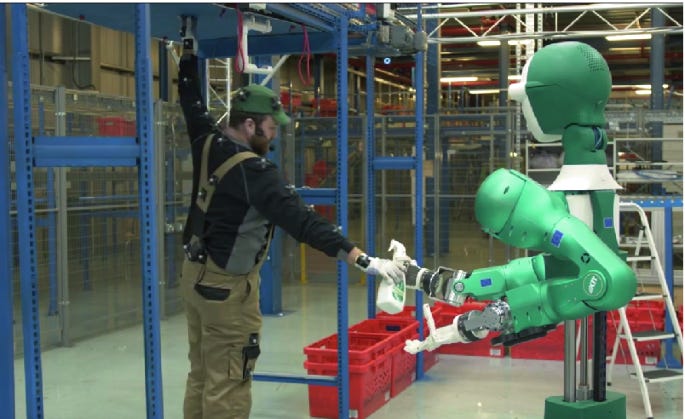For robots to succeed, they need to go back to school; Nvidia's bet on synthetic data; China's AI strategy; world's first AI-generated newspaper; DeepMind CEO predicts AGI in 5-10 years
Inside Zoom's AI evolution; more kids are using AI in schools; AI talent wars are still mega-hot; OpenAI's first Stargate data center revealed
At Nvidia's GTC 2025, CEO Jensen Huang proclaimed that "the future of AI is physical AI," signaling the acceleration of integrating artificial intelligence into the world of robotics. He also brought on stage Besh, a cute robot made by Disney to demonstrate Newton, an open source physics engine co-designed by Nvidia with Disney and Google DeepMind that promises to enhance robotic capabilities when performing complex tasks.
Yet, despite significant advancements in embodied AI, robots today still often struggle to perform reliably in dynamic, real-world scenarios. The underlying issue, according to one researcher from MBZUAI I’ve spoken to, lies in their training: most robots are predominantly educated in simulated environments that inadequately represent the complexities of physical reality.
Simulated environments are great in theory because they allow for rapid iteration and risk-free learning. However, these simulations often fail to capture the full complexity and unpredictability of the physical world, leading to a "sim-to-real" gap where robots underperform when deployed outside controlled settings. Factors such as unmodeled physical interactions, sensor noise, and dynamic environmental changes contribute to this discrepancy.
To bridge this gap, Abdalla Swikir, an assistant professor at MBZUAI, described to me this week a better educational model for embodied AI based on human schooling. You can think of it as "robot school" and it introduces structured, incremental learning stages designed to gradually equip robots with real-world skills. In this framework, robots would undergo a structured learning process, beginning with foundational skills in a "kindergarten" phase and progressively advancing to specialized competencies at a "university" level. This staged learning mirrors human development, allowing robots to acquire and refine skills incrementally.
This new way of teaching robots about the world around them is based on experiential learning, because robots are exposed to real-world scenarios early and often, facilitating the development of robust and adaptable behaviors. I’ve seen what happens when robots are built without this approach; years ago, when I was at Ocado, the company partnered with researchers from several universities to build SecondHands, a robot that would work in a warehouse as a technician’s assistant.
SecondHands was a great project and lots of technical advancements were made, but the software architecture was built in pieces and partly in simulated environments. So when the integration work was done and the robot was placed in Ocado’s warehouse, it struggled to deal with some of the real world challenges of its environment.
As Jensen Huang suggested, the future of AI may indeed be physical and adopting this human-inspired approach could finally unlock the true potential of robots in our everyday world so we can finally move away from highly choreographed and viral dance moves into more useful applications such as agriculture, healthcare or construction.
And now, here are the news:
❤️Computer loves
Our top news picks for the week - your essential reading from the world of AI
FT: Why China is suddenly flooding the market with powerful AI models
The Guardian: Italian newspaper says it has published world’s first AI-generated edition
CNBC: AI that can match humans at any task will be here in five to 10 years, Google DeepMind CEO says
VentureBeat: Inside Zoom’s AI evolution: From basic meeting tools to agentic productivity platform powered by LLMs and SLMs
Bloomberg: OpenAI’s First Stargate Site to Hold Up to 400,000 Nvidia Chips
Bloomberg: AI Pioneer Sees Handful of Models Surviving US, China Shakeout
Keep reading with a 7-day free trial
Subscribe to Computerspeak by Alexandru Voica to keep reading this post and get 7 days of free access to the full post archives.





